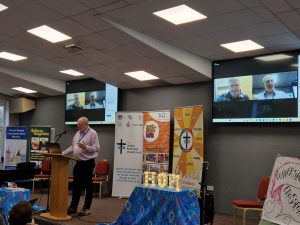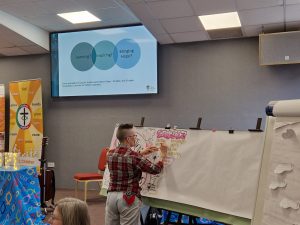The URC’s Training and Development Officer network opened the second day of the Conversations at the Crossroads conference and led the animators in collective worship. A closing prayer in the Lakota tradition was guided by the ordinal points – a prayer for people at the crossroads.
The Revd Dr Robert Pope led attendees in the second Bible study, exploring Deuteronomy 29:2-13 as an “instruction manual”. Moses challenges all Israel to “observe the words of this covenant and perform them, in order that you may find success in everything you do.” Although the choice at the crossroads is less binary, Robert suggested that the critical element is making choices faithfully. From themes of covenant and confession, two key questions emerged: what “word” have we heard, and what “word” are we waiting for?
The group was then asked to “spy out the land” (Deuteronomy 1:22), hearing stories and seeking opportunities. The Revd Dr Ash Barker, Founder and Director of Seedbeds, a global community committed to releasing the potential of local people, spoke on Zoom and shared exciting learning from work in West Midlands Synod and the Newbigin Pioneering Hub. The critical factor, Ash suggested, is training and resourcing local people – finding out what’s strong, not what’s wrong.

The group then heard from several animators who shared news of their inspirational missional projects. Dr Nigel Pimlott, a mission and ministry consultant, led the group onto a conversation about dreams of the promised lands where “the Lord your God is bringing you” (Deuteronomy 8:7). The Revds Steve Faber and Sally Willett spoke about some perspectives of promise within West Midlands Synod. Feeding back, many group conversations focussed on Kingdom and Church, as well as ways that can empower local communities to undertake their own process of discernment.
To emphasise the theme of journeying, the group reconvened after lunch with a rendition of John Denver’s Take Me Home Country Roads, followed by “open space” discussions in small self-selecting groups. Topics included mixed ecology, climate crisis, blockers to change, money and structures, and leadership.

Lindsey Brown, Evangelism and Ecumenical Officer, facilitated an ecumenical dialogue, with a panel featuring Revd Dr Ben Aldous, Churches Together in England’s Principal Officer for Mission and Evangelism, Revd Trey Hall, Methodist Connexional Team’s Director of Evangelism and Growth, and Revd Tim Norwood, The Church of England’s National Officer for Local Ecumenism. Ben reminded the animators that many Christian denominations are asking similar questions, and that the URC’s history and identity make it uniquely equipped to address them. Other reflections centred on evangelism, following a vision, making relationships, and the amount of time it takes to establish new Christian communities. A four-phase approach was suggested: midwifing and then sustaining, hospicing and revitalising.
Nigel led a final session before dinner, initiating a transition from exploration towards defining realisable actions with the help of three models. The Church Related Community Workers closed the day with evening devotions.

